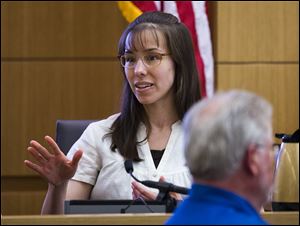
Arias returns to witness stand for juror questions
3/7/2013
Jodi Arias answers written questions from the jury during her murder trial in Maricopa County Superior Court in Phoenix. Arias is on trial for the 2008 murder of Travis Alexander.
PHOENIX — Jodi Arias returned to the witness stand Thursday to answer more questions from the jury for a second straight day in her Arizona death penalty trial as the panel repeatedly asked about her self-proclaimed memory problems and why she didn't try to help the victim after she says she killed him in self-defense.
Arias, 32, is charged with first-degree murder in the June 2008 killing of her lover in his suburban Phoenix home. Authorities say she planned the attack on Travis Alexander in a jealous rage.
The victim suffered nearly 30 knife wounds, had been shot in the head and had his throat slit.
Arias faced more than 220 questions from jurors overall through Wednesday and Thursday as the judge read them aloud to her.
Arizona is one of just a few states where jurors in every trial can ask questions of witnesses. In many other states, it's up to individual judges to decide whether it's permissible.
Thursday's questions largely focused on Arias’ contention that she has memory lapses during times of stress and can't recall much from the day of the killing. Juror questions also aimed to get at why she didn't try to save the victim's life after she shot and stabbed him, but instead, cleaned the scene and fled in order to create an alibi.
She has testified previously that she was too ashamed and scared to tell the truth.
“Why were you afraid of the consequences if you killed Travis in self-defense?” asked one juror in a question read aloud by the judge.
“I believed it was not OK ... to take someone's life even if you were defending yourself,” Arias replied softly.
“Why didn't you call 911 to help Travis?” read another juror question.
“I was scared to call anyone,” Arias said.
“Would you decide to tell the truth if you never got arrested?” another juror asked.
Arias paused briefly, thinking.
“I honestly don't know the answer to that question,” she said.
The juror questions came after Arias had spent 15 days on the witness stand testifying about her abusive childhood, cheating boyfriends, dead-end jobs and her contention that Alexander had grown physically abusive in the months leading up to this death, once even choking her into unconsciousness.
Experts say the sheer number of juror questions and their context indicate the panel's apparent disbelief in some of her previous testimony doesn't bode well for the defense.
“I think the message here is, ‘I think you're lying and I want to have you answer my questions directly,’” said Phoenix criminal defense attorney Julio Laboy.
“They're asking very specific questions, like when do you lie and when do you tell the truth,” he added. “Obviously, at least one juror doesn't believe a word she is saying.”
By late morning Thursday at the conclusion of juror questions, Arias’ defense attorney began to query her again over her responses. Both sides will now have the opportunity to question her but only on specific points raised by jurors.
Laboy said defense attorneys shouldn't bite at the chance, noting Arias has been on the witness stand long enough.
“Let Jodi's voice just end,” he said. “Her lawyer should try to be the good guy, ending it for everyone, for the jury and the spectators ... Jurors may not be happy if they don't have the last word.”
Arias has answered the often repetitive questions calmly and concisely at times, while others she has dodged and meandered with her responses.
But the jury's queries, and the fact that more continued to come in, clearly indicate that they aren't satisfied with her story.
None of her allegations of Alexander's violence and her claims that he had sexual desires for young boys have been corroborated by witnesses or evidence during the trial, and she has acknowledged lying repeatedly but insists she is telling the truth now.
Arias initially told authorities she had nothing to do with the killing then blamed it on masked intruders before settling on self-defense. She has been questioned repeatedly about her methodical efforts to create an alibi and avoid suspicion.
Many juror questions focused on things that just don't add up — how Arias can recall specific details of raunchy sexual encounters with Alexander, yet her memory is “scrambled” when she tries to recall events from the day she killed him. They specifically asked if she had ever sought medical treatment for her self-proclaimed memory problems. She said she didn't view it as a condition to be treated.
The panel also asked about her commitment to Mormon teachings. She converted to the faith after meeting Alexander, also a Mormon, but the two carried on an intense sexual relationship, despite church doctrine that discourages sex outside of wedlock.
Arias also has acknowledged trying to cover tracks, dumping the gun in the desert, getting rid of her bloody clothes, and leaving the victim a voicemail on his mobile phone within hours of killing him.
Arias’ grandparents had reported a .25 caliber handgun stolen from their Northern California home about a week before the killing — the same caliber used to shoot Alexander — but Arias says didn't take it. Authorities believe she brought it with her. Arias says she shot Alexander with his own gun she found in his closet as they tussled.